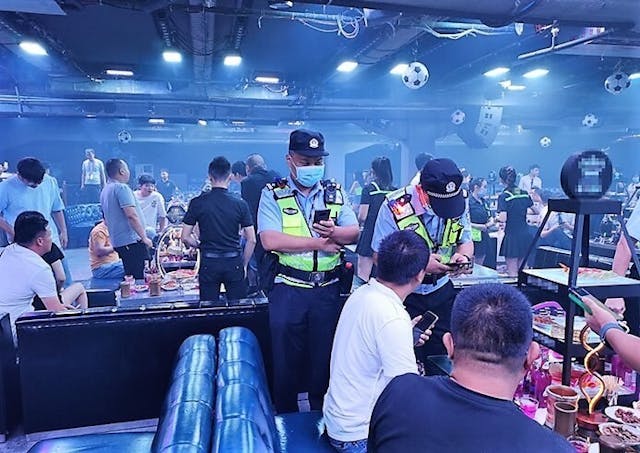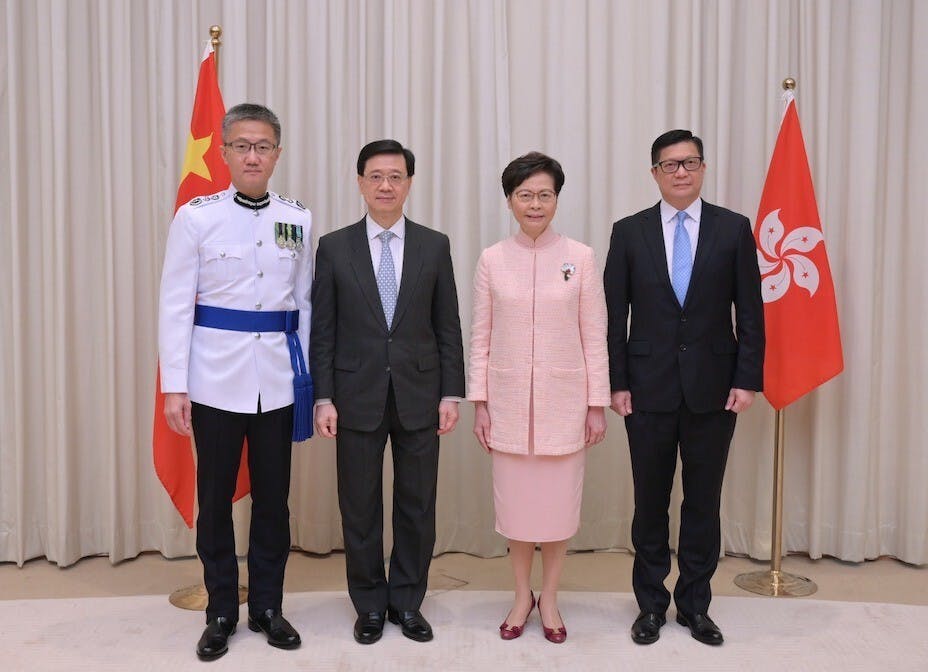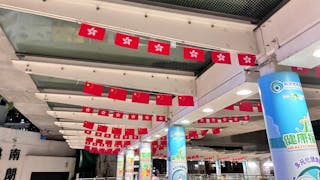粵港澳三地不久前進行的聯合反罪惡行動,在政治上意義重大,說明粵港澳的社會穩定,對三地同樣有直接影響。
廣東省公安廳6月25日公布,廣東省公安廳與香港、澳門警方於6月部署開展「雷霆2021」聯合打擊行動。6月18日至19日,粵港澳三地警方同步開展統一清查行動。行動中,廣東公安共清查娛樂場所5799處,檢查車輛7473輛;破獲刑事案件320起,抓獲涉案嫌疑人619名;查處治安案件504起,處罰治安案件違法人員803名;查獲涉毒人員69名,繳獲各類毒品107.6克及各類槍支7支、子彈164發。
粵港澳三地警方共同打擊犯罪
同時,粵港澳警方聯手偵破跨境有組織犯罪案件,珠海、中山等地公安機關聯合澳門警方展開跨境協作,成功破獲一宗「換錢黨」犯罪引發的故意殺人案。
6月12日,澳門警方發現一名殺人疑犯王某逃離澳門進入內地,即請求廣東公安機關展開緊急協查。6月13日,廣東公安機關抓獲王某。經審訊,王某對犯罪行為供認不諱,三地警方跨境協作取得勝利。
與此同時,深圳市公安機關聯合海警等部門開展打擊高速快艇走私行動,嚴防走私凍肉回流內地,行動中共查獲違法船只5艘、涉案走私物品8噸。
由6月6日至18日,香港警方也展開代號「雷霆2021」粵港澳三地聯合反罪惡行動,共搜查542個娛樂場所,拘捕了868人,年齡介乎13至84歲,包括31名內地人,49名非華裔,檢獲市值逾600萬元的毒品及精神科藥物,包括海洛英、可卡因、氯胺酮、冰毒及藍精靈等。
維安為中央及特區政府優先事項
三地警方的聯合反罪惡行動對粵港澳三地有佷大的政治意義。
首先,中國共產黨將迎來100周年黨慶,與聯合反罪惡風行動有很大關係。當局也必須為10月1日的國慶活動鋪平道路。如果內地是「依法治國」和部署警力維持社會秩序,同樣在香港和澳門也會看到。以香港為例,2020年6月下旬《港區國安法》的頒布和實施,證明了中央政府以法制維護特別行政區治安的決心。7 月 1 日,香港即將迎來回歸24 周年,維持治安已成為中央和香港特區政府議事日程上的優先事項。
其次,粵港澳聯合的反罪惡行動,伴隨着特區政府高層重大人事調整。6月25日,警務處前處長鄧炳強獲任命為新任保安局局長,而警務處副處長蕭澤頤則升任為新任警務處處長。最重要的是,保安局前局長李家超升任香港特區政府政務司司長。
翻查《大公報》2018年9月的報道,李家超在保安局局長任內,決定行使《社團條例》賦予的權力,禁止「香港民族黨」繼續運作,又在2021年6月,引用《港區國安法》條文凍結《蘋果日報》三間相關公司涉1800萬元資產,這些行動顯然得到中央政府的正面評價。

同樣重要的是,2021 年至 2022 年,香港將舉行三場選舉──選出新一屆選舉委員會成員、立法會選舉和新的行政長官。對香港特區和中央政府而言,保持社會穩定、法治和社會秩序是重中之重。
再者,澳門在2021年9月也將舉行新一屆立法會選舉,12月20日則將迎來回歸22周年,因此,2021年對中央政府、香港特別行政區和澳門特別行政區都具有極為重要的政治意義。
綜上所述,粵港澳三地持續的反罪惡行動具有政治意義。10月1日是中國共產黨成立100周年、7月1日是香港特別行政區回歸祖國24周年、12月20日是澳門回歸22周年,在這個情況下,維護粵港澳治安具有特殊意義。如果說「洗太平地」是中國人在為即將到來的慶祝活動做準備的說法,那麼粵港澳聯合反罪惡行動就必須放在更廣泛和宏觀的港澳政治背景下分析和理解。
Anti-Crime Policy Wind in Guangdong, Hong Kong and Macau: Stability and Governance
The ongoing anti-crime policy wind in Guangdong, Hong Kong and Macau is politically significant, illustrating social stability in command and having immediate implications for the governance of Hong Kong and Macau.
On June 25, the Guangdong Public Security Bureau (PSB) announced that Operation Thunderbolt 2021was conducted jointly by the police in Guangdong, Hong Kong and Macau to smash not only weapons, drugs and smuggling syndicates but also cross-border crime. The Guangdong PSB cracked down on 824 criminal cases and arrested 1,422 criminal suspects. From June 18 to 19, it had investigated 5,700 entertainment venues and arrested 619 suspects, while simultaneously punishing 803 members who violated the law and confiscating 7 guns with 164 bullets.
Moreover, the police in Guangdong, Hong Kong and Macau smashed a cross-border criminal syndicate in Zhuhai and Zhongshan areas where a gang of cheating money through money exchange led to a murder case. On June 12, the Macau police discovered that a suspect who murdered a victim in Macau sneaked into the mainland, thereby requesting assistance from the Guangdong PSB. On June 13, the Guangdong PSB swiftly arrested the suspect who committed the murder – an evidence in the triumph of cross-border police cooperation.
At the same time, the Shenzhen police collaborated with the marine police to smash smuggling syndicates which smuggled froze meat from Hong Kong to the mainland. Five boats were confiscated, and eight tons of smuggled food and products were found.
From June 6 to 18, the Hong Kong police cracked down on vices, investigated 542 entertainment venues, arrested 868 persons ranging from 13 to 84 years old, including 31 mainlanders and 49 non-Chinese. A total amount of HK$6 million worth of drugs was confiscated, including heroin, cocaine, ketamine, methamphetamine, and midazolam.
From June 18 to 19, the Hong Kong police mobilized 1,000 officers, who were led by the Deputy Commissioner (Operations) Raymond Siu Chak-yee. On June 25, Siu was promoted to be the Police Commissioner, while the former Police Commissioner Chris Tang was promoted to be the Secretary for Security.
The police operation on the nights of June 18 and 19 covered many districts, including Sham Shui Po, Sau Mau Ping, Kwun Tong, Sheung Shui, Cheung Kwan O, Central District, Tsimshatsui and Tsuen Wan. The police targeted at gambling dens, illegal liquor bars, mahjong parlors, and saunas. Obviously, the sources of triad revenues were the target of police crackdown, thereby stemming the growth of criminal organizations in the short run.
On June 19, the Macau police mobilized 380 officers, including six teams of police dogs, to conduct raids on entertainment venues in the Macau Peninsula and Taipa Island. The police also conducted investigations on the boats in the harbor and the coastal regions. The operation began from 11 pm and lasted until 3 am on the morning of June 20.
During the entire operation, the Macau police investigated 1,822 persons, including 34 persons who were brought to the police stations for further in-depth investigation. Fourteen of the 34 suspects were found to organize and participate in syndicates that cheated money from ordinary citizens through money exchange. Twelve mainlanders were arrested for overstaying in Macau. Moreover, a speedboat was stopped for smuggling luxurious food products, such as bird nest, and frozen meat from Macau to the mainland. Two smugglers were charged of violating the law on external trade; they tried to escape but were arrested by the marine police.
According to the Macau police, Operation Thunderbolt was characterized by the close cooperation and intelligence-sharing activities of the police in Guangdong, Hong Kong and Macau. The Macau police adopted the strategy of focusing on Macau’s law and order, conducting regular assessment, coordinating and directing subordinate units to conduct patrols and raids irregularly and in different targets. The three-way police cooperation between Guangdong, Hong Kong and Macau aims at destroying cross-border crime, especially illegal entry and exit as well as smuggling activities.
The ongoing anti-crime policy wind has tremendous implications for the good governance of Guangdong, Hong Kong and Macau.
First and foremost, the 100thanniversary of the Chinese Communist Party of China has significant impacts on the anti-crime policy wind, which must be held to pave the way for the national celebration on October 1. If the mainland is characterized by the deployment of law and police to maintain social order, the same phenomenon can be found in Hong Kong and Macau. In the case of Hong Kong, the promulgation of the national security law in late June 2020 and its implementation afterwards are a testimony to the determination of the central government to use legalism to maintain law and order in the special administrative region. As Hong Kong is approaching the 24thanniversary of its return of sovereignty to China on July 1, 2021, the maintenance of law and order is high on the policy priority of the agenda of the central authorities and the government of the Hong Kong Special Administrative Region (HKSAR).
Second, the anti-crime policy wind in the Guangdong-Hong Kong-Macau region has been accompanied by a significant personnel reshuffle at the top level of the HKSAR administration. On June 25, as mentioned before, the former Police Commissioner Chris Tang was appointed as the new Secretary for Security, while Deputy Police Commissioner Raymond Siu was promoted as the new Police Commissioner. Most importantly, the former Secretary for Security, John Lee, was promoted to be the Chief Secretary of the HKSAR government – an announcement made by the State Council of the Hong Kong Macau Affairs Office.
A reading of John Lee’s track record showed that he contributed immensely to the maintenance of law and order in the HKSAR. According to Ta Kung Pao on June 26, Lee played a crucial role in banning the operation of the Hong Kong National Party in September 2018 and in the use of the national security law in May 2021 to freeze parts of the asset of the Next Magazine and the assets of three companies possessed by Jimmy Lai (Ta Kung Pao, June 26, 2021, p. A1). His work was obviously appraised by the central authorities positively.
Lee’s appointment as the Chief Secretary was unprecedented in the personnel arrangements of the top level of the HKSAR administration. For the first time in the history of the HKSAR, a former Deputy Police Commissioner was eventually promoted as the Chief Secretary, a position that was usually occupied by former career civil servants (like Anson Chan, Donald Tsang, Matthew Cheung) and occasionally non-civil servant (Henry Tang).
Some Hong Kong commentators have quickly pointed to the importance of former police officers occupying the key positions of Chief Secretary and Secretary for Security – an accurate observation however neglecting the fact that the new appointments aim at not only stabilizing the HKSAR’s law and order situation but also, as Chief Executive Carrie Lam remarked in her press conference on June 25, paving the way for the stability of the new HKSAR administration starting from July 1, 2022.
In other words, the continuity of maintaining social stability, law and order is of paramount importance to both the HKSAR and the central authorities from 2021 to 2022, a key transition period during which there would be three elections – the election of the members of the new Election Committee, the Legislative Council election, and the new Chief Executive elections. As the new Secretary for Security, Chris Tang, said in his short remarks during the press conference on June 26, he and his colleagues would try their very best to deal with the “safety and stability” of the three elections and to “prevent and fight some local terrorism and those activities of external forces that use Hong Kong as an agent to endanger the national security of Hong Kong and our country (Ta Kung Pao, June 26, 2021, p. A1).”
Third, the current anti-crime policy wind aims at consolidating the law-and-order situation of Macau, where the new Legislative Council election will be held in September 2021 and where the 22ndanniversary of its transfer of sovereignty to China will take place on December 20 later this year. As such, the year of 2021 is of paramount political importance to the central authorities, the HKSAR and the Macau special administrative region.
In conclusion, the ongoing anti-crime policy wind in the Guangdong-Hong Kong-Macau region is politically significant. Under the circumstances in which October 1 will be the national celebration of the 100thanniversary of the ruling party in China, July 1 will be the 24thanniversary of the HKSAR return to the motherland, and December 20 will be the 22ndanniversary of Macau’s return to the Chinese nation, the maintenance of law and order in Guangdong, Hong Kong and Macau has special meaning. If “cleaning the floor to ensure peace” is a Chinese saying on a precondition of preparing for the forthcoming celebrative activities, the anti-crime policy wind must be analyzed and understood in the broader and macro-level political context of Hong Kong and Macau.
原刊於澳門新聞通訊社(MNA)網站,本社獲作者授權轉載。




































